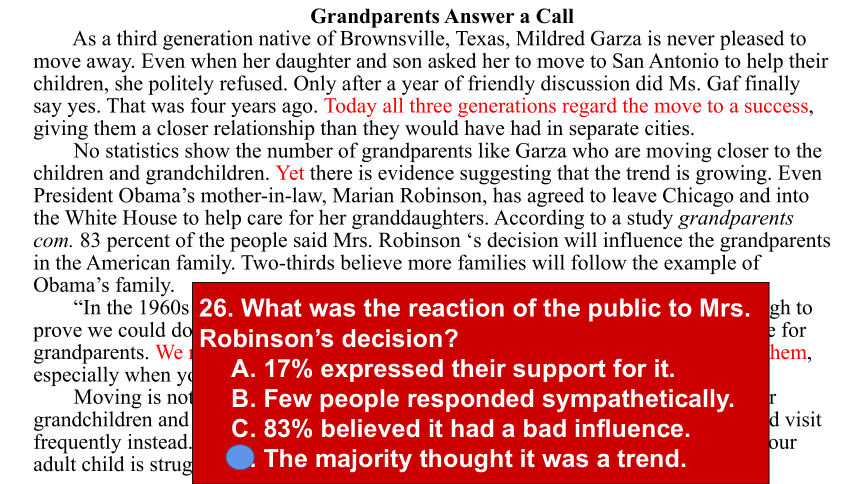2023届高考英语二轮复习阅读理解议论文解题策略课件(17张PPT)
文档属性
| 名称 | 2023届高考英语二轮复习阅读理解议论文解题策略课件(17张PPT) |  | |
| 格式 | pptx | ||
| 文件大小 | 487.1KB | ||
| 资源类型 | 教案 | ||
| 版本资源 | 通用版 | ||
| 科目 | 英语 | ||
| 更新时间 | 2023-02-09 10:40:29 | ||
图片预览







文档简介
(共17张PPT)
阅读理解之议论文
2023届高考英语二轮复习专题
议论文的功能就是说服他人,宣扬主张。说服读者接受某种意见或采取某种行为,目的是to persuade,to influence。其典型结构模式是:提出论点+提供论据(例证)+明确结论,也就是按提出问题、分析问题、解决问题的逻辑顺序来安排层次。阅读议论文的关键是抓论点。体现论点的主旨句多在文首或文尾、段首或段尾,这些都是阅读的重点部分。
议论文
议论文结构特点
写法一:正方(甲方),反方(乙方),我认为
写法二:提出问题,分析问题,回答(解决)问题
写法三:论点,理由(证据),重申论点。
Grandparents Answer a Call
As a third generation native of Brownsville, Texas, Mildred Garza is never pleased to move away. Even when her daughter and son asked her to move to San Antonio to help their children, she politely refused. Only after a year of friendly discussion did Ms. Gaf finally say yes. That was four years ago. Today all three generations regard the move to a success, giving them a closer relationship than they would have had in separate cities.
No statistics show the number of grandparents like Garza who are moving closer to the children and grandchildren. Yet there is evidence suggesting that the trend is growing. Even President Obama’s mother-in-law, Marian Robinson, has agreed to leave Chicago and into the White House to help care for her granddaughters. According to a study grandparents com. 83 percent of the people said Mrs. Robinson ‘s decision will influence the grandparents in the American family. Two-thirds believe more families will follow the example of Obama’s family.
“In the 1960s we were all a little wild and couldn’t get away from home far enough to prove we could do it on our own,” says Christine Crosby, publisher of Grate magazine for grandparents. We now realize how important family is and how important to be near them, especially when you’re raising children.”
Moving is not for everyone. Almost every grandparent wants to be with his or her grandchildren and is willing to make sacrifices, but sometimes it is wiser to say no and visit frequently instead. Having your grandchildren far away is hard, especially knowing your adult child is struggling, but giving up the life you know may be harder.
1. Old people live with their children (show an example--- to introduce )
2. The trend that old people live with their children is growing ( show another example---- to convince)
3. The importance of old people living with their children ( a quote ---- to confirm)
4. The author’s attitude to old people living with their children ( a demonstration ---- to oppose)
Old people should think twice before giving up their own life to live with their children.
提出问题
分析问题
解决问题
25. Why was Garza’s move a success
26. What was the reaction of the public to Mrs. Robinson’s decision
27. What did Crosby say about people in the 1960s
28. What does the author suggest the grandparents do in the last paragraph
题干分析
细节理解
细节理解
细节理解
推理判断
Grandparents Answer a Call
As a third generation native of Brownsville, Texas, Mildred Garza is never pleased to move away. Even when her daughter and son asked her to move to San Antonio to help their children, she politely refused. Only after a year of friendly discussion did Ms. Gaf finally say yes. That was four years ago. Today all three generations regard the move to a success, giving them a closer relationship than they would have had in separate cities.
No statistics show the number of grandparents like Garza who are moving closer to the children and grandchildren. Yet there is evidence suggesting that the trend is growing. Even President Obama’s mother-in-law, Marian Robinson, has agreed to leave Chicago and into the White House to help care for her granddaughters. According to a study grandparents com. 83 percent of the people said Mrs. Robinson ‘s decision will influence the grandparents in the American family. Two-thirds believe more families will follow the example of Obama’s family.
“In the 1960s we were all a little wild and couldn’t get away from home far enough to prove we could do it on our own,” says Christine Crosby, publisher of Grate magazine for grandparents. We now realize how important family is and how important to be near them, especially when you’re raising children.”
Moving is not for everyone. Almost every grandparent wants to be with his or her grandchildren and is willing to make sacrifices, but sometimes it is wiser to say no and visit frequently instead. Having your grandchildren far away is hard, especially knowing your adult child is struggling, but giving up the life you know may be harder.
25. Why was Garza’s move a success
A. It strengthened her family ties.
B. It improved her living conditions.
C. It enabled her make more friends.
D. It helped her know more new places.
Grandparents Answer a Call
As a third generation native of Brownsville, Texas, Mildred Garza is never pleased to move away. Even when her daughter and son asked her to move to San Antonio to help their children, she politely refused. Only after a year of friendly discussion did Ms. Gaf finally say yes. That was four years ago. Today all three generations regard the move to a success, giving them a closer relationship than they would have had in separate cities.
No statistics show the number of grandparents like Garza who are moving closer to the children and grandchildren. Yet there is evidence suggesting that the trend is growing. Even President Obama’s mother-in-law, Marian Robinson, has agreed to leave Chicago and into the White House to help care for her granddaughters. According to a study grandparents com. 83 percent of the people said Mrs. Robinson ‘s decision will influence the grandparents in the American family. Two-thirds believe more families will follow the example of Obama’s family.
“In the 1960s we were all a little wild and couldn’t get away from home far enough to prove we could do it on our own,” says Christine Crosby, publisher of Grate magazine for grandparents. We now realize how important family is and how important to be near them, especially when you’re raising children.”
Moving is not for everyone. Almost every grandparent wants to be with his or her grandchildren and is willing to make sacrifices, but sometimes it is wiser to say no and visit frequently instead. Having your grandchildren far away is hard, especially knowing your adult child is struggling, but giving up the life you know may be harder.
26. What was the reaction of the public to Mrs. Robinson’s decision
A. 17% expressed their support for it.
B. Few people responded sympathetically.
C. 83% believed it had a bad influence.
D. The majority thought it was a trend.
Grandparents Answer a Call
As a third generation native of Brownsville, Texas, Mildred Garza is never pleased to move away. Even when her daughter and son asked her to move to San Antonio to help their children, she politely refused. Only after a year of friendly discussion did Ms. Gaf finally say yes. That was four years ago. Today all three generations regard the move to a success, giving them a closer relationship than they would have had in separate cities.
No statistics show the number of grandparents like Garza who are moving closer to the children and grandchildren. Yet there is evidence suggesting that the trend is growing. Even President Obama’s mother-in-law, Marian Robinson, has agreed to leave Chicago and into the White House to help care for her granddaughters. According to a study grandparents com. 83 percent of the people said Mrs. Robinson ‘s decision will influence the grandparents in the American family. Two-thirds believe more families will follow the example of Obama’s family.
“In the 1960s we were all a little wild and couldn’t get away from home far enough to prove we could do it on our own,” says Christine Crosby, publisher of Grate magazine for grandparents. We now realize how important family is and how important to be near them, especially when you’re raising children.”
Moving is not for everyone. Almost every grandparent wants to be with his or her grandchildren and is willing to make sacrifices, but sometimes it is wiser to say no and visit frequently instead. Having your grandchildren far away is hard, especially knowing your adult child is struggling, but giving up the life you know may be harder.
27. What did Crosby say about people in the 1960s
A. They were unsure of raising more children.
B. They were eager to raise more children.
C. They wanted to live away from their parents.
D. They bad little respect for their grandparent.
Grandparents Answer a Call
As a third generation native of Brownsville, Texas, Mildred Garza is never pleased to move away. Even when her daughter and son asked her to move to San Antonio to help their children, she politely refused. Only after a year of friendly discussion did Ms. Gaf finally say yes. That was four years ago. Today all three generations regard the move to a success, giving them a closer relationship than they would have had in separate cities.
No statistics show the number of grandparents like Garza who are moving closer to the children and grandchildren. Yet there is evidence suggesting that the trend is growing. Even President Obama’s mother-in-law, Marian Robinson, has agreed to leave Chicago and into the White House to help care for her granddaughters. According to a study grandparents com. 83 percent of the people said Mrs. Robinson ‘s decision will influence the grandparents in the American family. Two-thirds believe more families will follow the example of Obama’s family.
“In the 1960s we were all a little wild and couldn’t get away from home far enough to prove we could do it on our own,” says Christine Crosby, publisher of Grate magazine for grandparents. We now realize how important family is and how important to be near them, especially when you’re raising children.”
Moving is not for everyone. Almost every grandparent wants to be with his or her grandchildren and is willing to make sacrifices, but sometimes it is wiser to say no and visit frequently instead. Having your grandchildren far away is hard, especially knowing your adult child is struggling, but giving up the life you know may be harder.
28. What does the author suggest the grandparents do in the last paragraph
A. Make decisions in the best interests’ of their own
B. Ask their children to pay more visits to them
C. Sacrifice for their struggling children
D. Get to know themselves better
We’ve all been there: in a lift, in line at the bank or on an airplane, surrounded by people who are, like us, deeply focused on their smartphones or, worse, struggling with the uncomfortable silence.
What’s the problem It’s possible that we all have compromised conversational intelligence. It’s more likely that none of us start a conversation because it’s awkward and challenging, or we think it’s annoying and unnecessary. But the next time you find yourself among strangers, consider that small talk is worth the trouble. Experts say it’s an invaluable social practice that results in big benefits.
Dismissing small talk as unimportant is easy, but we can’t forget that deep relationships wouldn’t even exist if it weren’t for casual conversation. Small talk is the grease(润滑剂) for social communication, says Bernardo Carducci, director of the Shyness Research Institute at Indiana University Southeast. "Almost every great love story and each big business deal begins with small talk," he explains. "The key to successful small talk is learning how to connect with others, not just communicate with them."
In a 2014 study, Elizabeth Dunn, associate professor of psychology at UBC, invited people on their way into a coffee shop. One group was asked to seek out an interaction(互动) with its waiter; the other, to speak only when necessary. The results showed that those who chatted with their server reported significantly higher positive feelings and a better coffee shop experience. "It’s not that talking to the waiter is better than talking to your husband," says Dunn. "But interactions with peripheral(边缘的) members of our social network matter for our well-being also."
Dunn believes that people who reach out to strangers feel a significantly greater sense of belonging, a bond with others. Carducci believes developing such a sense of belonging starts with small talk. "Small talk is the basis of good manners." he says.
1-2 introduce the topic---- small talk is worth the trouble.
3. Analysis the topic---- small talk benefits deep relationships.
4. Prove the topic ---- a study show small talk provides people with higher positive feelings.
5. Confirm the topic ---- small talk is beneficial.
32. What phenomenon is described in the first paragraph
33. What is important for successful small talk according to Carducci
34. What does the coffee-shop study suggest about small talk
35. What is the best title for the text
题干分析
细节理解
细节理解
推理判断
主旨大意
We’ve all been there: in a lift, in line at the bank or on an airplane, surrounded by people who are, like us, deeply focused on their smartphones or, worse, struggling with the uncomfortable silence.
What’s the problem It’s possible that we all have compromised conversational intelligence. It’s more likely that none of us start a conversation because it’s awkward and challenging, or we think it’s annoying and unnecessary. But the next time you find yourself among strangers, consider that small talk is worth the trouble. Experts say it’s an invaluable social practice that results in big benefits.
Dismissing small talk as unimportant is easy, but we can’t forget that deep relationships wouldn’t even exist if it weren’t for casual conversation. Small talk is the grease(润滑剂) for social communication, says Bernardo Carducci, director of the Shyness Research Institute at Indiana University Southeast. "Almost every great love story and each big business deal begins with small talk," he explains. "The key to successful small talk is learning how to connect with others, not just communicate with them."
In a 2014 study, Elizabeth Dunn, associate professor of psychology at UBC, invited people on their way into a coffee shop. One group was asked to seek out an interaction(互动) with its waiter; the other, to speak only when necessary. The results showed that those who chatted with their server reported significantly higher positive feelings and a better coffee shop experience. "It’s not that talking to the waiter is better than talking to your husband," says Dunn. "But interactions with peripheral(边缘的) members of our social network matter for our well-being also."
Dunn believes that people who reach out to strangers feel a significantly greater sense of belonging, a bond with others. Carducci believes developing such a sense of belonging starts with small talk. "Small talk is the basis of good manners." he says.
32. What phenomenon is described in the first paragraph
A. Addiction to smartphones.
B. Inappropriate behaviours in public places.
C. Absence of communication between strangers.
D. Impatience with slow service.
We’ve all been there: in a lift, in line at the bank or on an airplane, surrounded by people who are, like us, deeply focused on their smartphones or, worse, struggling with the uncomfortable silence.
What’s the problem It’s possible that we all have compromised conversational intelligence. It’s more likely that none of us start a conversation because it’s awkward and challenging, or we think it’s annoying and unnecessary. But the next time you find yourself among strangers, consider that small talk is worth the trouble. Experts say it’s an invaluable social practice that results in big benefits.
Dismissing small talk as unimportant is easy, but we can’t forget that deep relationships wouldn’t even exist if it weren’t for casual conversation. Small talk is the grease(润滑剂) for social communication, says Bernardo Carducci, director of the Shyness Research Institute at Indiana University Southeast. "Almost every great love story and each big business deal begins with small talk," he explains. "The key to successful small talk is learning how to connect with others, not just communicate with them."
In a 2014 study, Elizabeth Dunn, associate professor of psychology at UBC, invited people on their way into a coffee shop. One group was asked to seek out an interaction(互动) with its waiter; the other, to speak only when necessary. The results showed that those who chatted with their server reported significantly higher positive feelings and a better coffee shop experience. "It’s not that talking to the waiter is better than talking to your husband," says Dunn. "But interactions with peripheral(边缘的) members of our social network matter for our well-being also."
Dunn believes that people who reach out to strangers feel a significantly greater sense of belonging, a bond with others. Carducci believes developing such a sense of belonging starts with small talk. "Small talk is the basis of good manners." he says.
33. What is important for successful small talk according to Carducci
A. Showing good manners.
B. Relating to other people.
C. Focusing on a topic.
D. Making business deals.
We’ve all been there: in a lift, in line at the bank or on an airplane, surrounded by people who are, like us, deeply focused on their smartphones or, worse, struggling with the uncomfortable silence.
What’s the problem It’s possible that we all have compromised conversational intelligence. It’s more likely that none of us start a conversation because it’s awkward and challenging, or we think it’s annoying and unnecessary. But the next time you find yourself among strangers, consider that small talk is worth the trouble. Experts say it’s an invaluable social practice that results in big benefits.
Dismissing small talk as unimportant is easy, but we can’t forget that deep relationships wouldn’t even exist if it weren’t for casual conversation. Small talk is the grease(润滑剂) for social communication, says Bernardo Carducci, director of the Shyness Research Institute at Indiana University Southeast. "Almost every great love story and each big business deal begins with small talk," he explains. "The key to successful small talk is learning how to connect with others, not just communicate with them."
In a 2014 study, Elizabeth Dunn, associate professor of psychology at UBC, invited people on their way into a coffee shop. One group was asked to seek out an interaction(互动) with its waiter; the other, to speak only when necessary. The results showed that those who chatted with their server reported significantly higher positive feelings and a better coffee shop experience. "It’s not that talking to the waiter is better than talking to your husband," says Dunn. "But interactions with peripheral(边缘的) members of our social network matter for our well-being also."
Dunn believes that people who reach out to strangers feel a significantly greater sense of belonging, a bond with others. Carducci believes developing such a sense of belonging starts with small talk. "Small talk is the basis of good manners." he says.
34. What does the coffee-shop study suggest about small talk
A. It improves family relationships.
B. It raises people’s confidence.
C. It matters as much as a formal talk.
D. It makes people feel good.
We’ve all been there: in a lift, in line at the bank or on an airplane, surrounded by people who are, like us, deeply focused on their smartphones or, worse, struggling with the uncomfortable silence.
What’s the problem It’s possible that we all have compromised conversational intelligence. It’s more likely that none of us start a conversation because it’s awkward and challenging, or we think it’s annoying and unnecessary. But the next time you find yourself among strangers, consider that small talk is worth the trouble. Experts say it’s an invaluable social practice that results in big benefits.
Dismissing small talk as unimportant is easy, but we can’t forget that deep relationships wouldn’t even exist if it weren’t for casual conversation. Small talk is the grease(润滑剂) for social communication, says Bernardo Carducci, director of the Shyness Research Institute at Indiana University Southeast. "Almost every great love story and each big business deal begins with small talk," he explains. "The key to successful small talk is learning how to connect with others, not just communicate with them."
In a 2014 study, Elizabeth Dunn, associate professor of psychology at UBC, invited people on their way into a coffee shop. One group was asked to seek out an interaction(互动) with its waiter; the other, to speak only when necessary. The results showed that those who chatted with their server reported significantly higher positive feelings and a better coffee shop experience. "It’s not that talking to the waiter is better than talking to your husband," says Dunn. "But interactions with peripheral(边缘的) members of our social network matter for our well-being also."
Dunn believes that people who reach out to strangers feel a significantly greater sense of belonging, a bond with others. Carducci believes developing such a sense of belonging starts with small talk. "Small talk is the basis of good manners." he says.
35. What is the best title for the text
A. Conversation Counts
B. Ways of Making Small Talk
C. Benefits of Small Talk
D. Uncomfortable Silence
阅读理解议论文解题思路
Thanks!
阅读理解之议论文
2023届高考英语二轮复习专题
议论文的功能就是说服他人,宣扬主张。说服读者接受某种意见或采取某种行为,目的是to persuade,to influence。其典型结构模式是:提出论点+提供论据(例证)+明确结论,也就是按提出问题、分析问题、解决问题的逻辑顺序来安排层次。阅读议论文的关键是抓论点。体现论点的主旨句多在文首或文尾、段首或段尾,这些都是阅读的重点部分。
议论文
议论文结构特点
写法一:正方(甲方),反方(乙方),我认为
写法二:提出问题,分析问题,回答(解决)问题
写法三:论点,理由(证据),重申论点。
Grandparents Answer a Call
As a third generation native of Brownsville, Texas, Mildred Garza is never pleased to move away. Even when her daughter and son asked her to move to San Antonio to help their children, she politely refused. Only after a year of friendly discussion did Ms. Gaf finally say yes. That was four years ago. Today all three generations regard the move to a success, giving them a closer relationship than they would have had in separate cities.
No statistics show the number of grandparents like Garza who are moving closer to the children and grandchildren. Yet there is evidence suggesting that the trend is growing. Even President Obama’s mother-in-law, Marian Robinson, has agreed to leave Chicago and into the White House to help care for her granddaughters. According to a study grandparents com. 83 percent of the people said Mrs. Robinson ‘s decision will influence the grandparents in the American family. Two-thirds believe more families will follow the example of Obama’s family.
“In the 1960s we were all a little wild and couldn’t get away from home far enough to prove we could do it on our own,” says Christine Crosby, publisher of Grate magazine for grandparents. We now realize how important family is and how important to be near them, especially when you’re raising children.”
Moving is not for everyone. Almost every grandparent wants to be with his or her grandchildren and is willing to make sacrifices, but sometimes it is wiser to say no and visit frequently instead. Having your grandchildren far away is hard, especially knowing your adult child is struggling, but giving up the life you know may be harder.
1. Old people live with their children (show an example--- to introduce )
2. The trend that old people live with their children is growing ( show another example---- to convince)
3. The importance of old people living with their children ( a quote ---- to confirm)
4. The author’s attitude to old people living with their children ( a demonstration ---- to oppose)
Old people should think twice before giving up their own life to live with their children.
提出问题
分析问题
解决问题
25. Why was Garza’s move a success
26. What was the reaction of the public to Mrs. Robinson’s decision
27. What did Crosby say about people in the 1960s
28. What does the author suggest the grandparents do in the last paragraph
题干分析
细节理解
细节理解
细节理解
推理判断
Grandparents Answer a Call
As a third generation native of Brownsville, Texas, Mildred Garza is never pleased to move away. Even when her daughter and son asked her to move to San Antonio to help their children, she politely refused. Only after a year of friendly discussion did Ms. Gaf finally say yes. That was four years ago. Today all three generations regard the move to a success, giving them a closer relationship than they would have had in separate cities.
No statistics show the number of grandparents like Garza who are moving closer to the children and grandchildren. Yet there is evidence suggesting that the trend is growing. Even President Obama’s mother-in-law, Marian Robinson, has agreed to leave Chicago and into the White House to help care for her granddaughters. According to a study grandparents com. 83 percent of the people said Mrs. Robinson ‘s decision will influence the grandparents in the American family. Two-thirds believe more families will follow the example of Obama’s family.
“In the 1960s we were all a little wild and couldn’t get away from home far enough to prove we could do it on our own,” says Christine Crosby, publisher of Grate magazine for grandparents. We now realize how important family is and how important to be near them, especially when you’re raising children.”
Moving is not for everyone. Almost every grandparent wants to be with his or her grandchildren and is willing to make sacrifices, but sometimes it is wiser to say no and visit frequently instead. Having your grandchildren far away is hard, especially knowing your adult child is struggling, but giving up the life you know may be harder.
25. Why was Garza’s move a success
A. It strengthened her family ties.
B. It improved her living conditions.
C. It enabled her make more friends.
D. It helped her know more new places.
Grandparents Answer a Call
As a third generation native of Brownsville, Texas, Mildred Garza is never pleased to move away. Even when her daughter and son asked her to move to San Antonio to help their children, she politely refused. Only after a year of friendly discussion did Ms. Gaf finally say yes. That was four years ago. Today all three generations regard the move to a success, giving them a closer relationship than they would have had in separate cities.
No statistics show the number of grandparents like Garza who are moving closer to the children and grandchildren. Yet there is evidence suggesting that the trend is growing. Even President Obama’s mother-in-law, Marian Robinson, has agreed to leave Chicago and into the White House to help care for her granddaughters. According to a study grandparents com. 83 percent of the people said Mrs. Robinson ‘s decision will influence the grandparents in the American family. Two-thirds believe more families will follow the example of Obama’s family.
“In the 1960s we were all a little wild and couldn’t get away from home far enough to prove we could do it on our own,” says Christine Crosby, publisher of Grate magazine for grandparents. We now realize how important family is and how important to be near them, especially when you’re raising children.”
Moving is not for everyone. Almost every grandparent wants to be with his or her grandchildren and is willing to make sacrifices, but sometimes it is wiser to say no and visit frequently instead. Having your grandchildren far away is hard, especially knowing your adult child is struggling, but giving up the life you know may be harder.
26. What was the reaction of the public to Mrs. Robinson’s decision
A. 17% expressed their support for it.
B. Few people responded sympathetically.
C. 83% believed it had a bad influence.
D. The majority thought it was a trend.
Grandparents Answer a Call
As a third generation native of Brownsville, Texas, Mildred Garza is never pleased to move away. Even when her daughter and son asked her to move to San Antonio to help their children, she politely refused. Only after a year of friendly discussion did Ms. Gaf finally say yes. That was four years ago. Today all three generations regard the move to a success, giving them a closer relationship than they would have had in separate cities.
No statistics show the number of grandparents like Garza who are moving closer to the children and grandchildren. Yet there is evidence suggesting that the trend is growing. Even President Obama’s mother-in-law, Marian Robinson, has agreed to leave Chicago and into the White House to help care for her granddaughters. According to a study grandparents com. 83 percent of the people said Mrs. Robinson ‘s decision will influence the grandparents in the American family. Two-thirds believe more families will follow the example of Obama’s family.
“In the 1960s we were all a little wild and couldn’t get away from home far enough to prove we could do it on our own,” says Christine Crosby, publisher of Grate magazine for grandparents. We now realize how important family is and how important to be near them, especially when you’re raising children.”
Moving is not for everyone. Almost every grandparent wants to be with his or her grandchildren and is willing to make sacrifices, but sometimes it is wiser to say no and visit frequently instead. Having your grandchildren far away is hard, especially knowing your adult child is struggling, but giving up the life you know may be harder.
27. What did Crosby say about people in the 1960s
A. They were unsure of raising more children.
B. They were eager to raise more children.
C. They wanted to live away from their parents.
D. They bad little respect for their grandparent.
Grandparents Answer a Call
As a third generation native of Brownsville, Texas, Mildred Garza is never pleased to move away. Even when her daughter and son asked her to move to San Antonio to help their children, she politely refused. Only after a year of friendly discussion did Ms. Gaf finally say yes. That was four years ago. Today all three generations regard the move to a success, giving them a closer relationship than they would have had in separate cities.
No statistics show the number of grandparents like Garza who are moving closer to the children and grandchildren. Yet there is evidence suggesting that the trend is growing. Even President Obama’s mother-in-law, Marian Robinson, has agreed to leave Chicago and into the White House to help care for her granddaughters. According to a study grandparents com. 83 percent of the people said Mrs. Robinson ‘s decision will influence the grandparents in the American family. Two-thirds believe more families will follow the example of Obama’s family.
“In the 1960s we were all a little wild and couldn’t get away from home far enough to prove we could do it on our own,” says Christine Crosby, publisher of Grate magazine for grandparents. We now realize how important family is and how important to be near them, especially when you’re raising children.”
Moving is not for everyone. Almost every grandparent wants to be with his or her grandchildren and is willing to make sacrifices, but sometimes it is wiser to say no and visit frequently instead. Having your grandchildren far away is hard, especially knowing your adult child is struggling, but giving up the life you know may be harder.
28. What does the author suggest the grandparents do in the last paragraph
A. Make decisions in the best interests’ of their own
B. Ask their children to pay more visits to them
C. Sacrifice for their struggling children
D. Get to know themselves better
We’ve all been there: in a lift, in line at the bank or on an airplane, surrounded by people who are, like us, deeply focused on their smartphones or, worse, struggling with the uncomfortable silence.
What’s the problem It’s possible that we all have compromised conversational intelligence. It’s more likely that none of us start a conversation because it’s awkward and challenging, or we think it’s annoying and unnecessary. But the next time you find yourself among strangers, consider that small talk is worth the trouble. Experts say it’s an invaluable social practice that results in big benefits.
Dismissing small talk as unimportant is easy, but we can’t forget that deep relationships wouldn’t even exist if it weren’t for casual conversation. Small talk is the grease(润滑剂) for social communication, says Bernardo Carducci, director of the Shyness Research Institute at Indiana University Southeast. "Almost every great love story and each big business deal begins with small talk," he explains. "The key to successful small talk is learning how to connect with others, not just communicate with them."
In a 2014 study, Elizabeth Dunn, associate professor of psychology at UBC, invited people on their way into a coffee shop. One group was asked to seek out an interaction(互动) with its waiter; the other, to speak only when necessary. The results showed that those who chatted with their server reported significantly higher positive feelings and a better coffee shop experience. "It’s not that talking to the waiter is better than talking to your husband," says Dunn. "But interactions with peripheral(边缘的) members of our social network matter for our well-being also."
Dunn believes that people who reach out to strangers feel a significantly greater sense of belonging, a bond with others. Carducci believes developing such a sense of belonging starts with small talk. "Small talk is the basis of good manners." he says.
1-2 introduce the topic---- small talk is worth the trouble.
3. Analysis the topic---- small talk benefits deep relationships.
4. Prove the topic ---- a study show small talk provides people with higher positive feelings.
5. Confirm the topic ---- small talk is beneficial.
32. What phenomenon is described in the first paragraph
33. What is important for successful small talk according to Carducci
34. What does the coffee-shop study suggest about small talk
35. What is the best title for the text
题干分析
细节理解
细节理解
推理判断
主旨大意
We’ve all been there: in a lift, in line at the bank or on an airplane, surrounded by people who are, like us, deeply focused on their smartphones or, worse, struggling with the uncomfortable silence.
What’s the problem It’s possible that we all have compromised conversational intelligence. It’s more likely that none of us start a conversation because it’s awkward and challenging, or we think it’s annoying and unnecessary. But the next time you find yourself among strangers, consider that small talk is worth the trouble. Experts say it’s an invaluable social practice that results in big benefits.
Dismissing small talk as unimportant is easy, but we can’t forget that deep relationships wouldn’t even exist if it weren’t for casual conversation. Small talk is the grease(润滑剂) for social communication, says Bernardo Carducci, director of the Shyness Research Institute at Indiana University Southeast. "Almost every great love story and each big business deal begins with small talk," he explains. "The key to successful small talk is learning how to connect with others, not just communicate with them."
In a 2014 study, Elizabeth Dunn, associate professor of psychology at UBC, invited people on their way into a coffee shop. One group was asked to seek out an interaction(互动) with its waiter; the other, to speak only when necessary. The results showed that those who chatted with their server reported significantly higher positive feelings and a better coffee shop experience. "It’s not that talking to the waiter is better than talking to your husband," says Dunn. "But interactions with peripheral(边缘的) members of our social network matter for our well-being also."
Dunn believes that people who reach out to strangers feel a significantly greater sense of belonging, a bond with others. Carducci believes developing such a sense of belonging starts with small talk. "Small talk is the basis of good manners." he says.
32. What phenomenon is described in the first paragraph
A. Addiction to smartphones.
B. Inappropriate behaviours in public places.
C. Absence of communication between strangers.
D. Impatience with slow service.
We’ve all been there: in a lift, in line at the bank or on an airplane, surrounded by people who are, like us, deeply focused on their smartphones or, worse, struggling with the uncomfortable silence.
What’s the problem It’s possible that we all have compromised conversational intelligence. It’s more likely that none of us start a conversation because it’s awkward and challenging, or we think it’s annoying and unnecessary. But the next time you find yourself among strangers, consider that small talk is worth the trouble. Experts say it’s an invaluable social practice that results in big benefits.
Dismissing small talk as unimportant is easy, but we can’t forget that deep relationships wouldn’t even exist if it weren’t for casual conversation. Small talk is the grease(润滑剂) for social communication, says Bernardo Carducci, director of the Shyness Research Institute at Indiana University Southeast. "Almost every great love story and each big business deal begins with small talk," he explains. "The key to successful small talk is learning how to connect with others, not just communicate with them."
In a 2014 study, Elizabeth Dunn, associate professor of psychology at UBC, invited people on their way into a coffee shop. One group was asked to seek out an interaction(互动) with its waiter; the other, to speak only when necessary. The results showed that those who chatted with their server reported significantly higher positive feelings and a better coffee shop experience. "It’s not that talking to the waiter is better than talking to your husband," says Dunn. "But interactions with peripheral(边缘的) members of our social network matter for our well-being also."
Dunn believes that people who reach out to strangers feel a significantly greater sense of belonging, a bond with others. Carducci believes developing such a sense of belonging starts with small talk. "Small talk is the basis of good manners." he says.
33. What is important for successful small talk according to Carducci
A. Showing good manners.
B. Relating to other people.
C. Focusing on a topic.
D. Making business deals.
We’ve all been there: in a lift, in line at the bank or on an airplane, surrounded by people who are, like us, deeply focused on their smartphones or, worse, struggling with the uncomfortable silence.
What’s the problem It’s possible that we all have compromised conversational intelligence. It’s more likely that none of us start a conversation because it’s awkward and challenging, or we think it’s annoying and unnecessary. But the next time you find yourself among strangers, consider that small talk is worth the trouble. Experts say it’s an invaluable social practice that results in big benefits.
Dismissing small talk as unimportant is easy, but we can’t forget that deep relationships wouldn’t even exist if it weren’t for casual conversation. Small talk is the grease(润滑剂) for social communication, says Bernardo Carducci, director of the Shyness Research Institute at Indiana University Southeast. "Almost every great love story and each big business deal begins with small talk," he explains. "The key to successful small talk is learning how to connect with others, not just communicate with them."
In a 2014 study, Elizabeth Dunn, associate professor of psychology at UBC, invited people on their way into a coffee shop. One group was asked to seek out an interaction(互动) with its waiter; the other, to speak only when necessary. The results showed that those who chatted with their server reported significantly higher positive feelings and a better coffee shop experience. "It’s not that talking to the waiter is better than talking to your husband," says Dunn. "But interactions with peripheral(边缘的) members of our social network matter for our well-being also."
Dunn believes that people who reach out to strangers feel a significantly greater sense of belonging, a bond with others. Carducci believes developing such a sense of belonging starts with small talk. "Small talk is the basis of good manners." he says.
34. What does the coffee-shop study suggest about small talk
A. It improves family relationships.
B. It raises people’s confidence.
C. It matters as much as a formal talk.
D. It makes people feel good.
We’ve all been there: in a lift, in line at the bank or on an airplane, surrounded by people who are, like us, deeply focused on their smartphones or, worse, struggling with the uncomfortable silence.
What’s the problem It’s possible that we all have compromised conversational intelligence. It’s more likely that none of us start a conversation because it’s awkward and challenging, or we think it’s annoying and unnecessary. But the next time you find yourself among strangers, consider that small talk is worth the trouble. Experts say it’s an invaluable social practice that results in big benefits.
Dismissing small talk as unimportant is easy, but we can’t forget that deep relationships wouldn’t even exist if it weren’t for casual conversation. Small talk is the grease(润滑剂) for social communication, says Bernardo Carducci, director of the Shyness Research Institute at Indiana University Southeast. "Almost every great love story and each big business deal begins with small talk," he explains. "The key to successful small talk is learning how to connect with others, not just communicate with them."
In a 2014 study, Elizabeth Dunn, associate professor of psychology at UBC, invited people on their way into a coffee shop. One group was asked to seek out an interaction(互动) with its waiter; the other, to speak only when necessary. The results showed that those who chatted with their server reported significantly higher positive feelings and a better coffee shop experience. "It’s not that talking to the waiter is better than talking to your husband," says Dunn. "But interactions with peripheral(边缘的) members of our social network matter for our well-being also."
Dunn believes that people who reach out to strangers feel a significantly greater sense of belonging, a bond with others. Carducci believes developing such a sense of belonging starts with small talk. "Small talk is the basis of good manners." he says.
35. What is the best title for the text
A. Conversation Counts
B. Ways of Making Small Talk
C. Benefits of Small Talk
D. Uncomfortable Silence
阅读理解议论文解题思路
Thanks!
